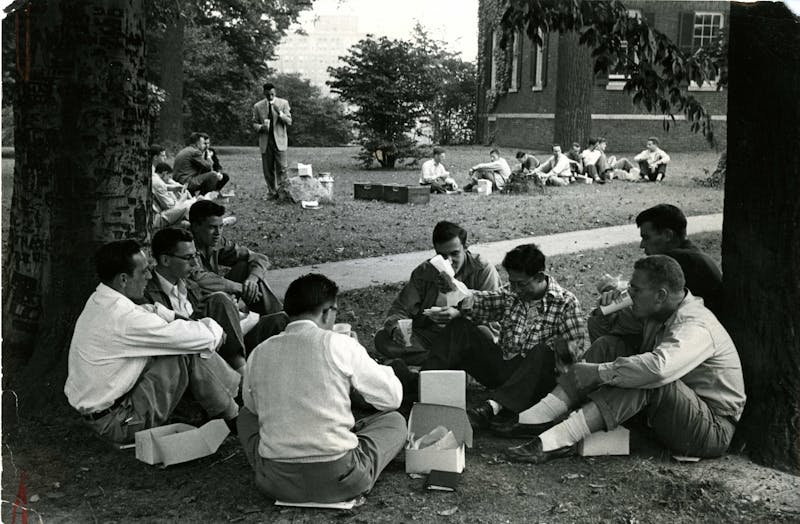
COURTESY OF THE UNIVERSITY ARCHIVES — SHERIDAN LIBRARIES
Students picnic next to Homewood House circa 1950, around when Griffith was Editor-in-Chief.

COURTESY OF THE UNIVERSITY ARCHIVES — SHERIDAN LIBRARIES
Students picnic next to Homewood House circa 1950, around when Griffith was Editor-in-Chief.
John Griffith was a News Editor 1952-53 and one of the Editors-in-Chief 1953-54. He is a professor emeritus in the Department of Health Management and Policy at the University of Michigan’s School of Public Health.
The News-Letter: Why did you first decide to join The News-Letter?
John Griffith: I graduated from high school in 1951. The Korean War was raging, and an easy way to stay out of the army was to start college right away, so I showed up on Homewood Campus in June and then in September I was officially a freshman. I had worked on various student publications in high school, so I thought I’d try The News-Letter. My freshman year, I worked for a News Editor named Al Epstein and did general reporting.
Sophomore year, I took Epstein’s post and helped a lot of freshmen learn how to write and became an editor at the start of my junior year. My colleague and I agreed that we needed to make the paper more user-friendly and less “academic.” My predecessors thought that debating the issue of communism was an important thing for The News-Letter to do, but he and I thought that an important thing for The News-Letter to do was cover what was happening on Homewood Campus. We shifted the focus, and I was just really delighted, and we gave it away for free. I was delighted to see my classmates and fellow students picking up copies and walking across the quad reading The News-Letter. I figured that was our big achievement.
N-L: What are some of the best or funniest personal stories from your time at The News-letter?
JG: We were at the time an all-male school, and Goucher was the closest local source of dates, and it was an all-female school. I remember a Phi Gamma Delta member went out to Goucher College in the middle of the night and tried to climb up a dormitory so he could steal some underwear. Unfortunately, he fell off the edge and landed in the yard. He was not hurt, and the next day this guy comes up to me and says, “For two cents, I’d punch you in the mouth.” I looked at the guy, and I remember he was captain of the wrestling team, so I talked my way out of it — took me 15 or 20 minutes, but I didn’t get any teeth knocked out.
N-L: What were some of your favorite articles that you wrote?
JG: I was an engineer, so I took an advanced math class in infinite series. I got a B on the final exam, another guy got a B, nobody got an A and everybody else got C+ or worse, so I thought that was worthy of a story. I went to interview the professor, and he said that the admission office was badly run and that at least half of students should be denied admission. Looking at the exam, I said, “The limit is zero,” and the guy had a goddamn tic. He just went absolutely ballistic. He was so sure he couldn’t figure out what the series looked like that he would demonstrate that even his B students didn’t really deserve to be here. He practically collapsed on the floor, so I wrote that up.
I also did a story on a woman I saw crossing Gilman Quad. It turned out she was a first-year grad student. She was not happy about being interviewed because she had all this attention drawn to her. There were a few females in the business offices and places like that and almost none on the faculty. There were close to no people of color on the faculty; there were only six people of color in my graduating class. It’s a different world.
N-L: How did The News-Letter impact your life as a college student? Why was it important to you?
JG: I kept busy, let’s put it that way. It took probably 70 to 80 hours per week, most afternoons and most Wednesdays 6 [p.m.] to 3 [a.m.] or later. I spent the rest of the time chasing the woman that I later married.
N-L: How did your time at The News-Letter help prepare you for your career after college? What did you learn at The News-Letter?
JG: I was a promising amateur writer when I arrived at campus because I had done a lot of work at high school. By the time I retired from the editor position, I was an accomplished writer. I’d also learned how to edit and teach because I spent most of my time as a News Editor teaching freshmen how to write.